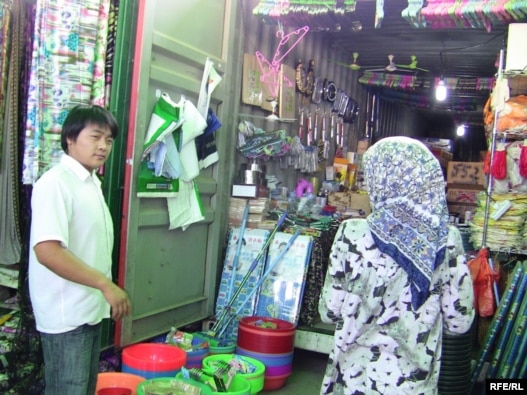Tajikistan to monitor illegal Chinese immigrants
| Publisher | Radio Free Europe/Radio Liberty |
| Publication Date | 10 November 2011 |
| Cite as | Radio Free Europe/Radio Liberty, Tajikistan to monitor illegal Chinese immigrants, 10 November 2011, available at: https://www.refworld.org/docid/4ec5046323.html [accessed 7 June 2023] |
| Disclaimer | This is not a UNHCR publication. UNHCR is not responsible for, nor does it necessarily endorse, its content. Any views expressed are solely those of the author or publisher and do not necessarily reflect those of UNHCR, the United Nations or its Member States. |
November 10, 2011
 A Chinese market in Dushanbe – some Tajiks claim that Chinese businessmen enjoy the support of their government, which is why their goods are cheaper.
A Chinese market in Dushanbe – some Tajiks claim that Chinese businessmen enjoy the support of their government, which is why their goods are cheaper.
DUSHANBE – Tajikistan's migration services agency plans to open a center to monitor the presence of tens of thousands Chinese migrants in the country, RFE/RL's Tajik Service reports.
Officially there are some 1,500 Chinese working in Tajikistan but organizations such as the International Organization for Migration (IOM) estimate there are more than 80,000 Chinese migrants in the country.
Muzaffar Zarifov, the head of the Tajik government's Center for Migration and Development, told RFE/RL on November 9 that it was very important to open such a center because cheap Chinese labor could exacerbate Tajikistan's unemployment problems.
He said Tajikistan should restrict immigration in order to save jobs for local people, who are forced to seek employment in Russia and other CIS countries. According to unofficial statistics, up to 1 million Tajiks go to Russia every year as seasonal laborers.
At the same time, Chinese citizens are coming in greater numbers to work in Tajikistan.
Chinese businessman Syan Loo, who goes by the Russian name Andrei, told RFE/RL on November 9 that he was absolutely satisfied with the working conditions in Tajikistan.
He said his shoe shop – which offers many other items and where you can even order a tractor – was situated close to the Tajik presidential palace and was always full of customers.
Tajik entrepreneurs complain that Chinese businessmen enjoy the support of their government, which is why their goods are cheaper. Tajiks, by contrast, cannot count on any such state support.
Tajik shop owners say they lose business to their Chinese rivals, even though only about 10 percent of Chinese businessmen speak Tajik, Russian, or English.
An official at Dushanbe's employment bureau told RFE/RL on condition of anonymity that a lot of Chinese migrants do not leave Tajikistan after their visa or work permits expire, but stay in the country and work illegally.
Some marry Tajik women in order to stay in the country. According to official statistics, during the first nine months of this year 13 children were born in Dushanbe's Hospital No. 1 to a Chinese father and Tajik mother.
Last month, the IOM launched several programs in Tajikistan for Chinese migrants.
Tajikistan has a 414-kilometer-long border with China, its eastern neighbor.
Link to original story on RFE/RL website
